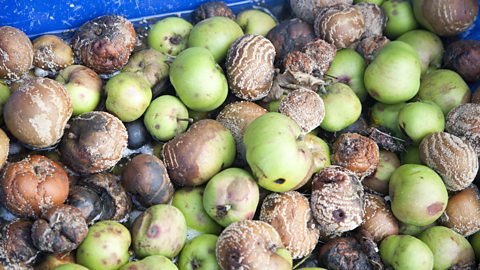Increasing food sustainability
Increasing food supplies without damaging the environment is a challenge. permacultureA way of growing food and plants sustainably, without impacting the environment negatively. is farming in a sustainable and self-sufficient manner.
Organic farming
organic farmingWhen crops are grown without the use of chemicals. uses natural methods to grow foods. This means using organic fertilisers and pesticides, such as animal slurryAnimal dung and excrement that can be used as a fertiliser. and natural predators and no artificial fertilisers or pesticides. Yields from organic crops are usually lower than those from inorganic crops but the difference varies between types of crop and over time. Organic farming is considered to be environmentally sustainable as it aims to minimise damage to ecosystems.
Urban farming initiatives
urban farmingThe growing of crops in and around towns and cities. involves growing food using space in and around cities. Urbanisation has led to a reduction in farmland and so urban farming helps to alleviate this problem. Urban farming plots can produce more food than equivalent areas of farmland. It also helps to reduce food milesThe distance food travels from producer to consumer., which is better for the environment.
Sustainable fish and meat
Modern fishing techniques use large nets. This often wipes out whole fish populations and many fish are trapped by accident. These are called bycatchFish (or other marine animals) caught unintentionally during fishing, eg dolphins in tuna nets.. Sustainable fishing involves catching fewer fish. Better net designs and a return to traditional fishing methods are examples of sustainable fishing.
Meat production is resource-heavy. 6.5 kg of grain and over 13,000 litres of water are needed to rear every kilogram of beef. Feeding grain to cattle reduces the time it takes them to grow, but means there is less grain for people to eat. Sustainable meat production involves using grass as animal feed.
Seasonal food consumption
In the past, people ate food that was in seasonOne of four times of the year (winter, spring, summer or autumn)., eg cabbages during the winter and salad crops during the summer. Food is now available out of season thanks to heated greenhouses to produce it in the UK and cold storage to transport it to the UK. seasonalBased on time of year (spring, summer, autumn and winter are all seasons). food consumption reduces food miles and electricity use.
Reduction of food waste
Developed nations waste a lot of food. Buying only the food that is needed is more sustainable as there is more food left to feed others.
